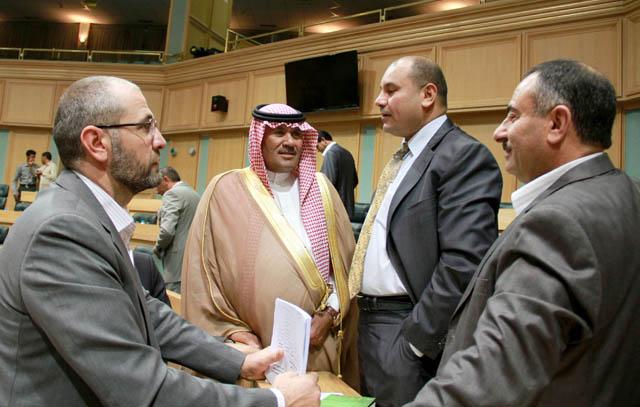You are here
40 MPs reject plan to import Israeli gas
By JT - Sep 10,2014 - Last updated at Sep 10,2014

AMMAN — At least 40 members of the Lower House signed on Wednesday a memorandum calling on the government to halt plans to import Israeli gas.
The lawmakers, led by MP Khamis Atiyeh, said in the memo that neither the government, nor the state-owned National Electric Power Company (NEPCO) “has the right to sign a deal with Zionists, because that means Jordanians will be paying the bill of occupation”, according to a copy of the memo obtained by The Jordan Times.
They said that the solution to the energy problems in Jordan lies in plans to generate electricity from alternative sources or resorting to buying from Arab countries, rather than from the “Zionist murderers”.
NEPCO will sign a deal in November to buy natural gas from Israeli fields starting late 2017, Minister of Energy and Mineral Resources Mohammad Hamed has said recently, triggering a public debate over the issue.
NEPCO signed a letter of intent last Wednesday with Noble Energy, which owns 39 per cent of the Leviathan natural gas field in Israel, to buy gas over a period of 15 years and at a total cost of $15 billion, the minister told The Jordan Times in an interview.
The two sides are currently in the process of drafting the details of the final agreement and agreeing on whether gas will be supplied to Jordan through vessels or via gas pipelines in Egypt.
This is the second agreement between a Jordanian company and Noble Energy. In February, the Arab Potash Company, a public shareholding company, signed a $771 million agreement with Noble Energy under which the latter will provide the company with 66 billion cubic metres of natural gas over a period of 15 years.
Jordan also has plans to buy gas from Gaza and Cyprus. It used to rely on Egyptian gas supplies, which have come to a complete halt due to terrorist attacks on the pipeline, prompting the Kingdom to rely on the more expensive heavy fuel to generate electricity.
Jordan imports about 96 per cent of its annual energy needs at a total cost of 20 per cent of the gross domestic product.
Related Articles
State-owned National Electric Power Company (NEPCO) will sign a deal in November to buy natural gas from Israeli fields starting late 2017, Minister of Energy and Mineral Resources Mohammad Hamed said Wednesday.
The government said Thursday the state-owned National Electric Power Company (NEPCO) is expected to buy 250-300 million cubic feet per day of natural gas from Noble Energy, which experts said will save around JD700 million annually of the energy bill.
AMMAN — Hundreds of Jordanians took to the streets on Friday demanding the termination of a gas deal between Jordan’s National Electric Powe













